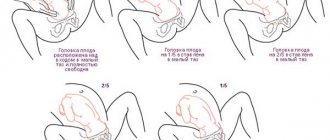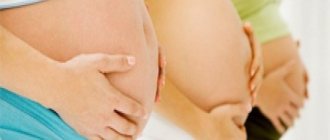Heartburn is a common companion of pregnant women; up to 80% of women, starting in the first trimester, complain of nausea and a burning sensation in the chest after eating. This physiological phenomenon is associated with the restructuring of the body to bear a fetus; usually, after the birth of a child, the fire in the esophagus goes away within 2-3 weeks. For some women, heartburn before childbirth becomes a constant torment. Not all drugs and folk remedies that relieve it are acceptable during pregnancy. What ways can you alleviate the condition of expectant mothers just before the birth of the baby?
Why does heartburn occur during pregnancy and lactation?
During each period of pregnancy, one of the factors that provoke heartburn comes into play. In late pregnancy, they act together, so during this period heartburn intensifies, sometimes becoming continuous.
First trimester
The first reason why heartburn occurs during pregnancy, even in healthy women, is the effect of progesterone. This female hormone provides favorable conditions for the growth of the embryo in the mother's body. He relaxes her smooth muscles so that spasmodic movements do not provoke a miscarriage. Along with all the muscles, the cardiac sphincter, the valve separating the esophagus and stomach, also relaxes. When it relaxes, attacks of heartburn occur: the acidic contents of the stomach easily penetrate the esophagus, react with its neutral environment, resulting in a burn to the mucous membrane of the esophagus.
Second half of pregnancy
In the second half of the term, another factor comes into play: the growing fetus increases the size of the uterus, it rises higher and higher, increasing intra-abdominal pressure. As a result of the pressure of the uterus on the stomach, its size is reduced, gastric juice splashes into the esophagus and reaches the pharynx, a burning sensation behind the sternum is complemented by a burning sensation and a lump in the throat. If a woman previously suffered from gastritis, peptic ulcers, or duodenitis, then during pregnancy these problems become aggravated.
Hormones affect the acidity of gastric juice; it has a stronger effect on the walls of the esophagus, which become inflamed, and this increases pain. It seems to the woman that no means can help her: the burning sensation does not go away even when she refuses food. In due time, gastric juice will still be released and penetrate the walls of the esophagus. The attacks are especially severe when lying down, so you even have to sleep in a sitting position.
Last weeks before giving birth
The last trimester of pregnancy can bring relief, but often makes the problem worse. Some women believe that heartburn in the last weeks of pregnancy is a sign that labor is imminent, but this is not true. At 39-40 weeks, the uterus descends into the pelvic area, as a result of which its pressure on the stomach and intestines is weakened. In addition, the body, in preparation for childbirth, reduces the synthesis of progesterone. All muscles become toned, the lower esophageal sphincter closes tightly again and protects the esophagus from the aggressive action of stomach hydrochloric acid.
Important! During the normal course of pregnancy, in the last days before childbirth, heartburn disappears - and this is a sign of the imminent onset of labor pains.
There are a number of reasons why painful symptoms do not go away until the birth of the child:
- Breech presentation of the fetus. Before birth, the baby in the womb takes a head down position - this is the best option for fetal movement during labor contractions. In this position, the uterus stops putting pressure on the stomach and intestines, and the symptoms of burning behind the sternum disappear. If the fetus assumes a head-up position, the fetus continues to put pressure on the stomach and cause heartburn until the baby is born.
- Multiple pregnancy, when the size of the abdomen, even in a lowered position, continues to put pressure on the abdominal organs.
- A particularly large fruit and the mother’s habit of eating “for two.” Overeating during pregnancy leads to unreasonable growth of the fetus and persistence of heartburn symptoms until the end of the term.
After childbirth
After childbirth, heartburn most often goes away on its own because intra-abdominal pressure normalizes . However, the effect of some factors that caused a burning sensation in the esophagus during pregnancy remains. Other reasons are added - and women complain that their heartburn does not go away even after childbirth:
- The first reason is exacerbation of chronic gastrointestinal diseases, increased stomach acidity, gastroesophageal reflux disease. A nursing mother cannot cope with such problems on her own; qualified treatment is necessary.
- During lactation, the effect of progesterone, which relaxes the muscles of the cardiac sphincter, increases again. Overeating and late-night snacking fill the stomach and cause heartburn.
- Incorrect body position after eating: a woman, having eaten well, immediately lies down to feed the baby or rest, in which case a backflow (reflux) of the acidic contents of the stomach into the esophagus occurs. Heartburn after eating appears if you immediately bend over and do the necessary work in this position.
- Stress and lack of sleep provoke an increase in the acidity of gastric juice and intensify the burning sensation in the chest.
Heartburn during pregnancy and lactation does not harm the baby. However, for the woman herself it is far from harmless: relaxation of the esophageal sphincter and inflammation of the walls of the esophagus threaten digestive disorders and the development of oncology. It is not recommended to endure heartburn in the hope that it will go away on its own; you should use all available means to alleviate its symptoms.
Causes of heartburn
It is possible to get rid of heartburn during pregnancy quite quickly. This symptom appears quite often in women, so do not panic. When the causes are stress, you just need to relax and calm down, the result will not be long in coming - the discomfort will go away.
Treatment methods:
- Tablets - your doctor may prescribe treatment. It is usually accompanied by taking medications.
- Handy remedies - some foods have the ability to relieve the symptoms of heartburn, thereby alleviating the condition of a pregnant woman.
- Calmness – Stress very often causes discomfort, which can contribute to new irritation. Therefore, to prevent the burning sensation from constantly bothering you, you need to lead a healthy lifestyle and try to avoid stress.
Treatment of heartburn in late pregnant women primarily depends on the cause of its occurrence. This is why you should not take medications without consulting a gynecologist.
In order to avoid the question: “How to get rid of heartburn?”, it is better to follow simple recommendations and thereby prevent its occurrence.
To do this, you must follow the following rules:
- You can't eat too much before bed.
- It is necessary to exclude spicy, fatty and heavy foods from the diet.
- Eat less fried, smoked and over-salted foods.
- Chew your food well.
- If a pregnant woman does not experience edema, it is necessary to drink enough fluids.
- You can't lie down after eating.
- During pregnancy, you should lead an active lifestyle. Pregnancy is not a disease, so you need to move.
- Choose the right clothes. Uncomfortable things can trigger stress, which can lead to heartburn.
Products that cause burning
Preventing heartburn during pregnancy
Knowing the mechanism of burning in the chest area, you must consciously do everything to prevent acid reflux from the stomach. To do this, several simple but important conditions must be observed.
Diet
- Eat often, in small portions, so as not to overfill your stomach with food.
- It is very good to chew food for a long time - this way it will not linger in the stomach for long.
- During meals, do not dilute gastric juice with excess liquid; you can drink it an hour before or after meals.
- Immediately after eating, do not take a horizontal position or bend over, so as not to provoke the backflow of food into the esophagus. Go to bed 1.5-2 hours after dinner.
Diet
To relieve the symptoms of burning in the esophagus, you need to limit the consumption of foods that provoke heartburn. These include:
- spicy, fatty, fried foods;
- fresh bakery;
- citrus fruits, sour berries (cranberries, currants, gooseberries);
- carbonated drinks, kvass;
- onions, garlic, cabbage, tomatoes;
- chocolate, coffee, cocoa.
To reduce unwanted symptoms, eat:
- dried white bread;
- boiled meat and fish;
- porridge flavored with butter;
- baked fruits and vegetables;
- sunflower oil, seeds;
- grated carrots and carrot juice; prunes, boiled beets;
- milk and fermented milk products;
- compotes, jelly, herbal teas (ginger and chamomile), mineral water.
Other means of prevention
The upper body should be elevated during sleep; it is best to sleep on your back, with high pillows.
Clothes should not restrict the stomach. To improve digestion, it is useful for pregnant women to perform gymnastic exercises - stretching the arms and legs, but in no case bending or sharp turns. It is important to maintain correct posture and not slouch. The knee-elbow pose (child's pose in yoga gymnastics) is very useful for pregnant women. This position allows all nearby organs to restore blood circulation and take a break from the constant pressure of the stretched uterus on them.
Prenatal period
In later stages of pregnancy, unpleasant symptoms may intensify. This is due to the following factors:
- ongoing changes in hormonal levels with an increase in the amount of progesterone for subsequent muscle relaxation,
- the inability of the said muscular valve to perform its functions due to increased intra-abdominal pressure,
- the enlarged reproductive organ - the uterus - puts strong pressure on the digestive organs, which is reflected by the release of hydrochloric acid,
- The prenatal position of the baby with its head up causes pressure on the abdominal diaphragm, which increases the release of acidic contents.
The intrauterine development of an unborn baby can increase the mother's appetite. Therefore, overeating can also be considered a factor in the appearance of bitterness in the mouth and throat.
How to get rid of heartburn attacks before childbirth
During pregnancy, conventional heartburn remedies can be harmful, so they should be used infrequently and only on the recommendation of a doctor.
What drugs should you give up?
It is not recommended to use products that can only intensify the burning sensation behind the sternum. These include:
- antispasmodics (No-Shpa, Papaverine) - they relax the muscle of the lower esophageal sphincter;
- mint, which also reduces muscle tone;
- soda - having extinguished the acid in the esophagus, it triggers the reaction of its accelerated synthesis in the stomach. In addition, taking it increases swelling, because... it is absorbed into the blood and disrupts the acid-base balance.
Medicines
The safest remedy for heartburn is baking soda. It helps neutralize the acidic contents of the esophagus and stomach. Soda relieves the condition, but after 15-20 minutes the heartburn returns again. Therefore, it can only be used if absolutely necessary.
Inexpensive heartburn pills include antacids. They do not have a harmful effect on the fetus. They have an effect similar to that of soda. These include “Rennie”, “Maalox”, “Phosphalugel” and “Almagel” suspensions.
This group of drugs is used one hour after meals. They also need to be taken at night. Antacids cannot be combined with other medications.
For heartburn, which is accompanied by belching and vomiting, it is recommended to take prokinetics. They speed up the motility of the gastrointestinal tract and relieve the woman of negative symptoms. The group of drugs includes “Sab Simplex” and “Espumizan”.
In addition to inexpensive tablets for heartburn, adsorbents are used to relieve attacks. They are able to regenerate the mucous membrane of the gastrointestinal tract and remove harmful metabolic products from the body. “Smecta” is the safest adsorbent that can be used during pregnancy without negative effects on the fetus.
If there is no therapeutic effect, doctors prescribe proton pump inhibitors. The drugs reduce the acidity of gastric juice, preventing heartburn attacks. The most famous include “Omeprazole” and “Rabeprazole”.
What helps with heartburn in pregnant women? Before using any folk remedy, a woman should consult a doctor. Olive or sunflower oil is sometimes used to relieve heartburn attacks. The product is able to envelop the gastric mucosa, reducing the negative effects of hydrochloric acid.
Natural remedies for treating heartburn include potatoes. To do this, prepare the root vegetable in water and infuse the resulting solution for several hours. This remedy is drunk half an hour before meals.
Celery root is also used to prevent heartburn. It is used three times a day 30 minutes before meals. An infusion of dried plant roots has a similar effect.
Medicinal herbs are also used to reduce heartburn attacks. Decoctions and infusions are prepared from them. The most commonly used are wormwood and chamomile. The drug is taken several times a day half an hour before meals.
Medical nutrition
What helps with heartburn in pregnant women? For prevention purposes, the specialist prescribes a special diet for the woman. The entire daily diet should be divided into 5 meals. Food must be taken at regular intervals. The diet should include foods that have an alkaline reaction, neutralizing the hydrochloric acid of gastric juice.
The diet should include cottage cheese, milk and sour cream. For protein foods, you should stick to beef, rabbit and chicken. It is not forbidden to eat eggs and fish. Carrots, eggplants and other vegetables are best consumed boiled or stewed.
View gallery
If you have severe heartburn before giving birth, avoid foods with an acidic environment from your diet. A woman needs to give up juices, fresh fruits and vegetables. Fatty and spicy foods should be excluded from the menu.
Before birth
The effect of an acidic environment is felt almost until birth. However, it is not possible to say for sure whether there can be heartburn before the birth itself. This period can also be characterized by its complete absence. Two weeks before the birth of the baby, the pregnant woman’s belly drops down, which affects the decrease in intra-abdominal and gastric pressure. This is why many women in labor do not experience attacks of bitterness, acidity in the throat and mouth.
Important! You can reduce unpleasant bitterness with the help of medications and traditional medicine that reduce stomach acidity, but only after consulting a doctor.
Possible complications
The constant reflux of gastric contents into the esophagus provokes irritation of its mucous membrane. An aggressive acidic environment promotes cell death, as well as the formation of ulcers and erosions. Heartburn during pregnancy in the third trimester contributes to the occurrence of esophagitis - inflammation of the mucous membrane of the esophagus.
It leads to difficulty swallowing and stagnation of food masses in the upper gastrointestinal tract.
View gallery
Frequent attacks of heartburn are one of the attacks of benign and malignant neoplasms of the esophagus. Hydrochloric acid can cause abnormal cell division in the mucous membrane of the organ. Constant reflux of acidic contents can lead to bleeding.
Effect on pregnancy
Heartburn as an independent symptom does not have a direct effect on the process of bearing a baby. When stomach contents are thrown into the esophagus no more than 3 times a week, there is no threat to the health of the mother and unborn child.
Constant heartburn worsens a woman's quality of life. It provokes melancholy and depression. Negative emotions can lead to stress. Severe heartburn intensifies before childbirth, so it can cause a premature birth of a child.
View gallery
It is a symptom of gastrointestinal diseases. Pathology impairs the absorption of nutrients. In chronic diseases of the small intestine, iron deficiency anemia may develop. It can lead to oxygen starvation of the fetus. With a prolonged course of the disease, intrauterine growth retardation and sometimes death are possible.
In rare cases, acute fatty liver degeneration occurs. The pathology is quite rare, occurring in one in 10,000 expectant mothers. This is one of the most dangerous diseases.











